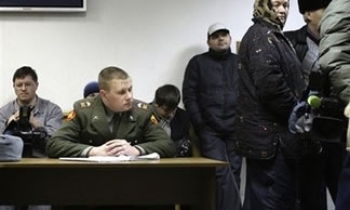A former USA Today reporter who was ordered to pay hefty fines starting at midnight Tuesday for refusing to name confidential sources for a story, has been granted a stay, Agence France-Presse (AFP) has reported quoting court sources.
"It is ordered that the motion for a stay pending appeal be granted," a clerk at a US court of appeals in Washington told AFP, reading from the order. "Appellant has satisfied the stringent standards required for a stay pending appeal," the clerk read, hours before the first payment of 500 dollars (325 euros) was due.
Reporter Toni Locy was last week ordered by US District Court Judge Reggie Walton to pay a daily fine of US$500, rising in steps to US$5,000 dollars, for refusing to name the sources for a story she wrote about Steven Hatfill, a former army bioweapons scientist named a "person of interest" in the 2001 anthrax attacks. The judge also ordered that Locy pay the fines with no help from her employer, friends, family or even anonymous supporters.
The International Federation of Journalists (IFJ) welcomed the decision of the appeals court. But the judgement is a temporary reprieve and only reinforces arguments, said IFJ, in favour of a federal shield law to allow journalists to protect confidentiality of their sources.
“We welcome this decision to block the fines but the contempt order is completely inappropriate. The legal system is being used to intimidate journalists and their sources,” said IFJ General Secretary Aidan White. “This case shows why the US needs a national law that will protect reporters from this type of judicial action.”
“The federal shield law will protect journalists from attempts to force journalists to reveal their sources when there is no compelling safety or security reason to do so,” said Linda Foley, The Newspaper Guild (TNG) President and member of the IFJ Executive Committee. “This is one of numerous cases where journalists have put themselves on the line to protect confidential sources, a critical tool for investigative reporters.”
Details from the AFP story:
Gannett, the parent company of USA Today, on Monday filed a motion with the court of appeals for an emergency stay of the contempt citation, and a coalition of about two dozen media companies and non-profit journalism organizations also filed an 'amicus brief' in support of Locy the same day.
Hatfill, meanwhile, filed a response on Tuesday, seeking to bar the stay. The former army scientist was named a "person of interest" by investigating authorities in the United States after anthrax-laced letters were sent to several lawmakers and television offices in October 2001.
Five people, including two post office workers in Washington, died of anthrax inhalation.
In the original complaint Hatfill filed against Locy in August 2003, he alleged that "the Justice Department had violated the Privacy Act by making unauthorised disclosures about him to the news media—that is, by intentionally 'leaking' investigative information," his response to the motion for a stay said.
Locy has said in court that she could not remember all her sources, and was ordered to pay the rising fines, on her own, until such time as she did name them. She also faced prison if she failed to name the confidential sources by early April.
"We've never seen anything like this," Gregg Leslie, the legal defense director at the Reporters Committee for Freedom of the Press (RCFP), said of the rising fines imposed on Locy, and the judge's order that she pay them on her own.
"The only authority the judge tried to base it on were cases that had to do with whether a lawyer who was found in contempt of court could have a client reimburse him. So we think he based it on a pretty poor precedent and, yes, there isn't anything like it in any other contempt case," Leslie told AFP. "It is troubling that courts are going to allow this kind of examination of a reporter's work product," he added.
Locy had said that enforcing the contempt order could have a chilling effect by calling into question the enforceability of reporters' secrecy agreements with public officials, according to the Associated Press (AP).
The AP report said.
"I am relieved and thankful that the court of appeals has found that my legal arguments are worthy of consideration," said Locy, a former reporter with the Associated Press who wrote the anthrax stories while at USA Today. She now teaches journalism at West Virginia University.
Appeals court judges Douglas Ginsburg, Judith Rogers and Brett Kavanaugh granted the reporter's request. Ginsburg was appointed by President Reagan, Rogers by President Clinton and Kavanaugh by the current President Bush.









